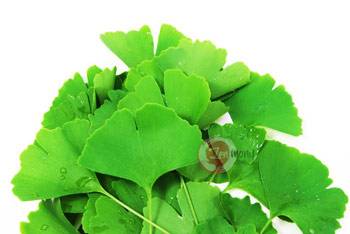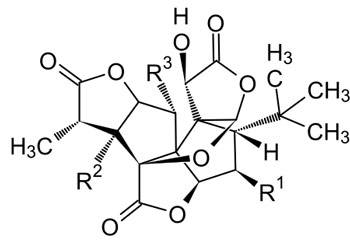| 2015 | APR | |||||||
| 2014 | JUL | OCT | DEC | |||||
| 2013 | JAN | FEB | APR | MAY | JUN | JUL | AUG | SEP |
| 2012 | SEP | OCT | NOV | DEC |
Ginkgo biloba plant brims with vital powers
- Ginkgo biloba is a special plant
- Ginkgo is best known for two great health effects
- Through multiple studies conducted in Japan, Germany, France and other countries, it became clear that polyphenols and ginkgolide are among those substances responsible for achieving ginkgo's health effects
Ginkgo biloba is a special plant.
 Firstly, its fertilization method is peculiar. Most plants are fertilized when the spermatozoid nucleus in the pollen travels through the pollen tube and combines with the egg cell. In most cases, insects deliver the stamen pollen to the pistil. More than 100 years ago Sakugoro Hirase from the Japan Imperial University discovered that ginkgo spermatozoids can move on their own. This alone says a lot about how much vital power a ginkgo can possess. The modern form of the Ginkgo appeared on Earth around 250 millions of years ago, which makes it one of the oldest plants we can see today. During this extremely long period of time, the ginkgo had to go through multiple challenges, the biggest of which was surviving through four glacial epochs. It is said that about 250 millions of years ago there were at least 13 types of ginkgo trees. Fossil remains of ancient ginkgo leaves are found in such locations as China, Japan, Australia, Canada, western America, England and many others. Only one out of the 13 kinds of ginkgo that used to flourish on Earth managed to survive through all these harsh ordeals. Representatives of this wonderful plant, the lifespan of which can be as long as one thousand years, can now be found in China and some parts of Japan.
Firstly, its fertilization method is peculiar. Most plants are fertilized when the spermatozoid nucleus in the pollen travels through the pollen tube and combines with the egg cell. In most cases, insects deliver the stamen pollen to the pistil. More than 100 years ago Sakugoro Hirase from the Japan Imperial University discovered that ginkgo spermatozoids can move on their own. This alone says a lot about how much vital power a ginkgo can possess. The modern form of the Ginkgo appeared on Earth around 250 millions of years ago, which makes it one of the oldest plants we can see today. During this extremely long period of time, the ginkgo had to go through multiple challenges, the biggest of which was surviving through four glacial epochs. It is said that about 250 millions of years ago there were at least 13 types of ginkgo trees. Fossil remains of ancient ginkgo leaves are found in such locations as China, Japan, Australia, Canada, western America, England and many others. Only one out of the 13 kinds of ginkgo that used to flourish on Earth managed to survive through all these harsh ordeals. Representatives of this wonderful plant, the lifespan of which can be as long as one thousand years, can now be found in China and some parts of Japan.
Ginkgo is best known for two great health effects
First, ginkgo extract spreads out blood vessels, and second it thins and cleans the blood flowing inside them. Both of these effects are beneficial for preventing diseases of blood vessels and for eliminating atheromas, which are made of erythrocytes and thrombocytes and which can potentially block the normal flow of blood inside arteries. By spreading the blood vessels, ginkgo prevents blood from becoming too thick and sticky. Blood vessels in the human body constantly go through cycles of contracting and expanding. Generally, if sympathetic nerves become predominant in the autonomous nervous system, the blood vessels contract, and if parasympathetic nerves become predominant, they expand. If blood vessels contract, then the blood flows faster. Through evolution, humans developed so that in a dangerous situation, our bodies become combat-ready, which requires more oxygen to be delivered and more energy to be produced. To achieve this, our blood vessels need to shrink and boost the flow of blood. But we should not maintain this combat-ready state for too long and our parasympathetic nervous system should kick in, letting our body switch back to the relaxation mode. The blood vessels expand and the blood flows more smoothly. In this way, by switching between contraction and expansion of the blood vessels, our bodies can maintain their balance and health. It goes without saying that modern society brims with stress, and often we are in this combat-ready state longer than our bodies can handle it, so our blood vessels stay constantly contracted. If this condition continues for too long, the level of blood plasma goes down and our blood becomes thicker, which can cause atherosclerosis or hardening of the blood vessels. Stress management techniques should not be underestimated if we want to stay healthy in a stressful environment. Gingko can also be beneficial by acting like the hormones responsible for expanding the blood vessels and helping us relax. These hormones are secreted when the parasympathetic nerves become active. The second most important health effect of ginkgo is the prevention of blood clots. Blood clots (Latin name “thrombi”) are made of some of the different substances found in blood and are necessary to save humans from excessive bleeding. Without a blood clot, even a small injury could lead to an excessive loss of blood and eventually death. Our blood itself provides a mechanism to stop excessive bleeding. The main pillar of this mechanism is the thrombocytes. When blood vessels are broken and blood leaks out, the thrombocytes gather at the break and make clots, which helps other components of the blood to accumulate, solidify and stop the bleeding. Meanwhile, the skin and other tissues are regenerated and the injury becomes fully healed. If our thrombocytes did not function the way they do, we would have major health problems and our life would be in danger. For example, people with inborn hemophilia suffer from excessive blood leakage, both external and internal. Thus, thrombocytes are essential for sustaining our life. Because they coagulate easily, these thrombocytes can also, under certain conditions, cause problems. For example they can form blood clots and atheromas, which can cause diseases of blood vessels such as cerebral and myocardial infarctions. Ginkgo can be useful in preventing this unwanted coagulation of blood components.Through multiple studies conducted in Japan, Germany, France and other countries, it became clear that polyphenols and ginkgolide are among those substances responsible for achieving this effect
Ginkgo first attracted the attention of researchers because of its polyphenols (which are basically plant pigments). Many plants are known to contain polyphenols such as flavon, flavonol, catechin and others. Ginkgo is known to contain more than 20 types of polyphenols, which are known to improve the flow of blood inside brain arteries. They also improve the efficiency of glucose and oxygen, which make the source of energy used by the brain. In experiments conducted by the German company Schwabe Co. Ltd., test animals where fed ginkgo extract and it became clear that the flow of blood inside the heart increased by 78% for about 22 minutes. In the same experiment, scientists tried to achieve a similar effect through feeding polyphenols extracted from other plants to the animals. In this case, they needed roughly a three times larger amount of polyphenols. This led the scientists to the conclusion that either ginkgo polyphenols possess special characteristics, or that there are some other substances which increase this anticoagulative effect, or both. Ginkgolide is another important functional component found in ginkgo. Ginkgolide, working together with flavonoids, promotes such effects as the expansion of blood vessels, improving general blood circulation, increasing the flow of blood in heart arteries, activating the metabolism inside brain cells and improving the discharge of bodily wastes. Two other proven health effects of ginkgolide are the amelioration of the symptoms of allergies and the detoxication of activated oxygen. Ginkgolide antagonizes a biologically active substance called PAF (platelet-activating factor). PAF is needed by our bodies, but if too much of it is secreted, it can trigger medical conditions such as atopic dermatitis, asthma, sneezing, a runny nose and other allergy symptoms. By detoxifying oxygen radicals, ginkgolide enhances the protection of blood vessels by ginkgo. Ginkgolide combined with other polyphenols found in ginkgo can effectively normalize the level of oxygen radicals in blood.
Ginkgolide antagonizes a biologically active substance called PAF (platelet-activating factor). PAF is needed by our bodies, but if too much of it is secreted, it can trigger medical conditions such as atopic dermatitis, asthma, sneezing, a runny nose and other allergy symptoms. By detoxifying oxygen radicals, ginkgolide enhances the protection of blood vessels by ginkgo. Ginkgolide combined with other polyphenols found in ginkgo can effectively normalize the level of oxygen radicals in blood.Check out similar products here


